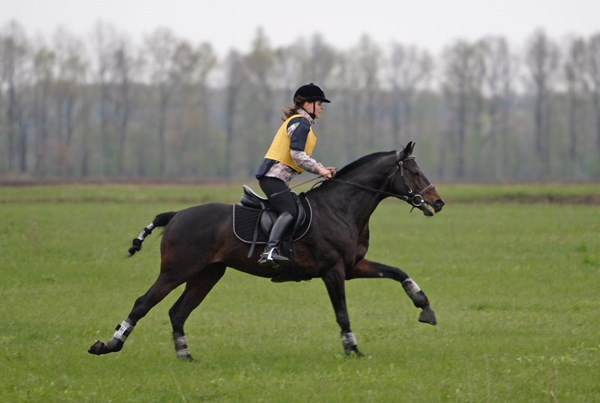 Credit: Thinkstock Having a vet-client-patient relationship will allow your horse to get the proper vaccinations he needs to be healthy within his lifestyle.
Credit: Thinkstock Having a vet-client-patient relationship will allow your horse to get the proper vaccinations he needs to be healthy within his lifestyle.The old saying, “An ounce of prevention goes a long way” couldn’t apply more to your horse and their vaccinations. Today’s vaccines are very effective at protecting horses from many diseases. Equine diseases that were once a very real threat to survival now rarely appear due to the regular use of vaccines. While many vaccines can be obtained at feed stores or via internet/catalog order companies, the best vaccine for your horse is one administered by a veterinarian. Aside from scheduling and selecting the proper vaccinations that your horse needs, only your veterinarian has the knowledge to monitor and treat adverse reactions, and develop a wellness program to help guarantee your horse a long and happy life. And keep in mind that vaccine handling prior to administration can directly affect whether or not your horse is protected as vaccines can quickly lose their effectiveness by being exposed to sunlight, or freezing or high temperatures.
A veterinary-client-patient-relationship will insure your veterinarian designs a vaccination schedule specific to your horse’s needs. Taking into consideration the age of the horse, its intended use and the possibility of exposure to potential diseases, your veterinarian can accurately select the vaccines needed. According to the American Association for Equine Practitioners (AAEP) Vaccination Guidelines, all horses require the following core vaccines: tetanus, Eastern/Western encephalitis, West Nile virus and rabies. Based on age, exposure risk (frequent travel to shows), and location your veterinarian may recommend vaccination against botulism, equine herpesvirus, equine influenza, Potomac horse fever, rotavirus and strep equi (strangles). When choosing which vaccinations your horse needs, the veterinary-client-patient-relationship and the history and knowledge of working with your horses/herd will help your veterinarian design the best vaccination schedule for you.
With a vaccination schedule in hand your veterinarian can select specific products from several vaccine manufacturers. By staying up-to-date on the newest products available and the most recent research, veterinarians can choose the best products for your horse. Utilizing polyvalent or combination vaccines helps minimize injection sites and the possibility for adverse vaccine reactions. Your veterinarian will also know the proper techniques and location to administer the vaccines. The most common route of administration is intramuscularly, but several new vaccines work best when administered intranasally. Also obtaining vaccines from a veterinarian insures the vaccines have been handled and stored properly before being administered to your horse.
An inherent risk with vaccinations are adverse reactions, which can range from injection site swelling, muscle soreness, fever, anorexia, and lethargy to systemic anaphylaxis. Anaphylaxis is a medical emergency and requires immediate veterinary attention. While reactions may range from mild to severe, veterinarians can report them to the vaccine manufacturers who will often work with the veterinarian to determine the cause of the reaction. The vaccine manufacturer will then investigate any adverse incidents associated with products in response to inquiries. Many manufacturers offer protection guarantee programs and guarantee the effectiveness of their product. Most of these claims are often times honored with the direct involvement of a licensed practitioner.
A wellness program and vaccination schedule designed and administered by your veterinarian will help your horse throughout its life. Following vaccination guidelines properly insures the right vaccines are given at the right time and that your veterinarian is present should an adverse reaction take place. An ounce of prevention goes a long way–preventing tetanus with a vaccination is much cheaper than treating tetanus once contracted. Protect your horse, protect your investment, contact your veterinarian or any Hagyard veterinarian to discuss your vaccination program today.
For more information on the AAEP Vaccination Guidelines visit www.AAEP.org.
This article was written by Ernie Martinez, DVM, of Hagyard Equine Medical Institute.


